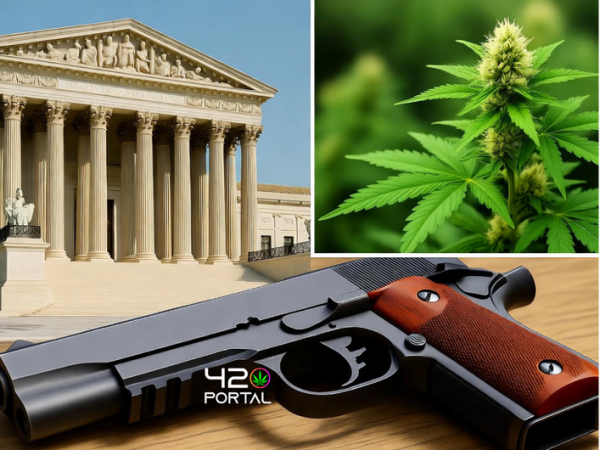Firearms and Freedom: The Clash Over Marijuana and the Second Amendment

10/24/2025
A pivotal legal battle is unfolding in the Supreme Court that could redefine the boundaries of gun ownership. At its core, the dispute questions whether federal restrictions barring marijuana users from possessing firearms align with the Second Amendment's guarantee of the right to bear arms. This isn't just about pot—it's a high-stakes test of how modern regulations stack up against constitutional protections, potentially reshaping enforcement in a country where recreational marijuana is legal in over two dozen states, yet federally classified as a dangerous drug.
The federal statute in question, part of longstanding gun control measures, prohibits anyone who is an "unlawful user" of controlled substances—including marijuana—from owning or buying firearms. Enacted decades ago amid the war on drugs, the law aims to keep weapons out of the hands of those deemed unreliable or dangerous. Critics, however, argue it casts too wide a net, ensnaring law-abiding citizens who partake in a substance increasingly viewed as benign. In states like Tennessee, where marijuana remains fully illegal and gun culture runs deep, the rule has long served as a prosecutorial hammer, turning minor possession into felony charges.
The challenge stems from a Texas case where a man faced charges after authorities discovered small amounts of marijuana and cocaine in his vehicle alongside a handgun. Defenders of the accused contend that disarming non-violent cannabis consumers lacks historical precedent, echoing the Supreme Court's 2022 Bruen decision, which demands gun laws mirror traditions from the founding era. "This boils down to core freedoms," one legal expert notes. "The right to self-defense shouldn't hinge on personal choices that don't threaten public safety."
On the other side, the government insists the restriction is rooted in age-old practices of disarming the intoxicated or unreliable, from colonial militias to early American statutes. Supporters highlight public safety: marijuana impairs judgment, much like alcohol, and mixing it with guns invites tragedy. Statistics show substance use correlates with higher rates of accidental shootings and domestic violence, bolstering the case for caution.
A ruling favoring gun rights could invalidate similar bans nationwide, easing access for millions of occasional users while complicating federal efforts to regulate firearms. It might also spotlight the growing chasm between state cannabis reforms and outdated federal policies, prompting calls for broader legalization. Conversely, upholding the law would reinforce federal authority, but at the risk of alienating a public where over 70% now support marijuana reform.
Reference
The federal statute in question, part of longstanding gun control measures, prohibits anyone who is an "unlawful user" of controlled substances—including marijuana—from owning or buying firearms. Enacted decades ago amid the war on drugs, the law aims to keep weapons out of the hands of those deemed unreliable or dangerous. Critics, however, argue it casts too wide a net, ensnaring law-abiding citizens who partake in a substance increasingly viewed as benign. In states like Tennessee, where marijuana remains fully illegal and gun culture runs deep, the rule has long served as a prosecutorial hammer, turning minor possession into felony charges.
The challenge stems from a Texas case where a man faced charges after authorities discovered small amounts of marijuana and cocaine in his vehicle alongside a handgun. Defenders of the accused contend that disarming non-violent cannabis consumers lacks historical precedent, echoing the Supreme Court's 2022 Bruen decision, which demands gun laws mirror traditions from the founding era. "This boils down to core freedoms," one legal expert notes. "The right to self-defense shouldn't hinge on personal choices that don't threaten public safety."
On the other side, the government insists the restriction is rooted in age-old practices of disarming the intoxicated or unreliable, from colonial militias to early American statutes. Supporters highlight public safety: marijuana impairs judgment, much like alcohol, and mixing it with guns invites tragedy. Statistics show substance use correlates with higher rates of accidental shootings and domestic violence, bolstering the case for caution.
A ruling favoring gun rights could invalidate similar bans nationwide, easing access for millions of occasional users while complicating federal efforts to regulate firearms. It might also spotlight the growing chasm between state cannabis reforms and outdated federal policies, prompting calls for broader legalization. Conversely, upholding the law would reinforce federal authority, but at the risk of alienating a public where over 70% now support marijuana reform.
Reference







